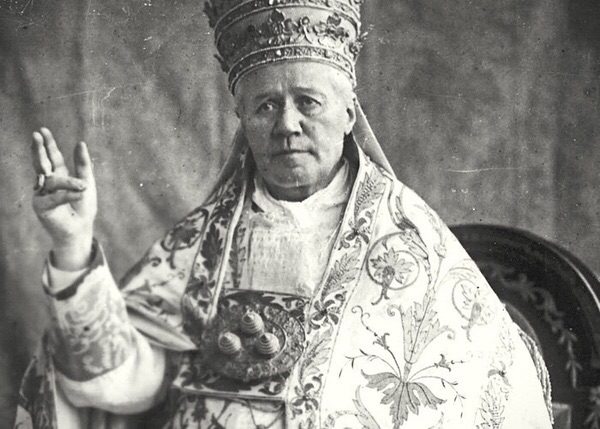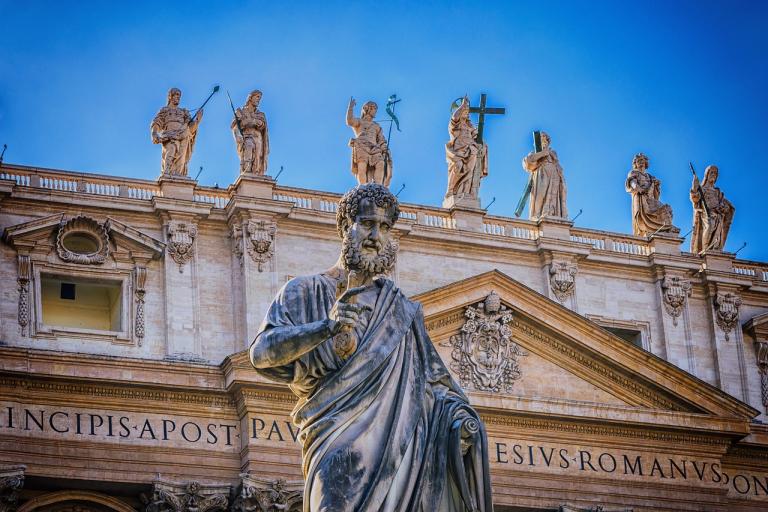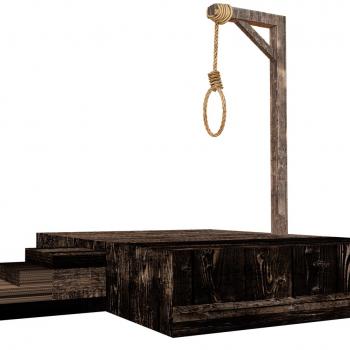
Pope Pius X, by Giuseppe Felici, public domain
This is really a post about the New Evangelization and how blogs fit in (and how they do not), but I must go through some set-up first. I had already chosen the new title for this blog, secured the new URL, and was fast at work making it pretty, when lo! over on Facebook someone—let us call him A.—shared a presumptuous post to my timeline. (I really should turn that baneful feature off that allows people to just post to your timeline.) The post in question was a podcast promoting some obscure Marian apparition, rejected by the local bishop. I won’t give it further attention by naming it here; it is that bad.
I deleted the post, cast A. to the winds, and sent out the following status to my remaining people:
I do not, on my wall, promote Marian apparitions that are not approved by the Church. Only the Church has competence to judge these things. Podcasts are not the Magisterium. That is all.
In the comments, B. showed up to exclaim: “Oh right! And I guess blogs aren’t the Magisterium either!”
How fortuitous, since I sat at work on this wery site.
But B. was correct: Blogs are not the Magisterium. 1 Tim. 3:15 does not mention blogs. Christ was not talking to bloggers when he said, in John 16:13, that the Holy Spirit will “guide you into all truth.”
(Col. 4:6, however, is good advice for bloggers: “Let your speech be alway with grace, seasoned with salt, that ye may know how ye ought to answer every man.”)
It is necessary to remind ourselves daily of such things; which is one good reason I chose the title this blog now has. I will see it each time I sit down to write. I may need to. Many Catholics have a recurring feeling that such reminders are needful. Blogs do oft proceed as though they are equal to the Magisterium, or judge the Magisterium, or interpret the Magisterium, or replace the Magisterium, or scorn the Magisterium, or wield the Magisterium like a thunderbolt to strike the bad ones down. Blogs do oft proceed as though they are giving their readers the truly true, insider, Gnostic truth; the dangerous threat to the Church uncovered in an exclusive by brave anonymous sources; the secret Marian revelation about the end of days; or the definitive list of heresies of those who must not ever by any means call themselves Catholic. But no. There is no “blogisterium.” Bloggers (and podcasters and people on Twitter and Facebook) do not discern the spirits, or the signs of the times, or the heresies of the pope, or the heresies in the pews, or the heresies on other blogs.
Back in 2010, the blog In Cælo et in Terra was reminding bloggers of this:
The Magisterium consists of the pope and the bishops in union with him. Their authority does not belong to man, but to God, although men can wield it, so to speak. It is not an authority that belongs to everyone, and we must not pretend it does. A blogger who claims to live and act in unity with the Church can certainly speak truth, even has an obligation to do so. But he (or she) should not attack or use ‘hurtful, judgmental language.’ You are not the Magisterium.
Just last year, Terry Nelson at Abbey Roads wrote similar words:
Don’t believe me though—you can’t trust me either. Believe what the Church teaches. Do what the Pope and the Synod Fathers say—and if some give bad example—don’t do as they do—but do as they say. Don’t go to strangers online who sometimes are in it to make a living—they are ‘divided’ by that very fact. Remember, you can’t be holier than the Church. Don’t go to strangers online for spiritual direction.
Now, I have no problem with bloggers who make all or part of their living doing what they do. Kudos to them. I do not think that creates, of itself, a divided loyalty. But the warning is well-taken against bloggers who have acquired a “following” that clings to their every post as though that’s the very place the real truth, and what’s really going on, is to be found. In the combox is a cheering section for the our brave hero the blogger, or a hissing section for the whole lot of baneful heretics who would bring the Church down were it not for our brave hero the blogger. (One more reason I don’t have a combox.)
What Mr. Nelson says, I say of myself and my own blog: Don’t believe me. Believe the Church. Hold me, as I try to hold myself and all that I write, to what the Church has said. If I say it here, check it out. I am not Sacred Scripture. I am not the Magisterium. The conclave did not choose me. God is not giving me private revelations. I have no undercover sources in felt hats braving it all. I am not in the business of pronouncing anathemas on other Catholics. I’m a guy with a blog who has a certain ability to put one word after another.
***
None of this means that blogs have no role to play in leading people to the Church, and to the truth. Both Pope Benedict XVI and Pope Francis have told us that they do. Benedict XVI said they have the ability to be “portals of truth and faith” as well as “new spaces for evangelization.” And Francis has called the Internet “a gift from God.”
Blogs, like all online media, have an important role to play in the New Evangelization. That is particularly so in a world in which, as George Weigel has pointed out, the culture is no longer passing on the faith. (For indeed the culture is hostile to the faith; and as you know, dear reader, I have spilled much virtual ink on this wery blog answering media fictions about the Church, and in particular about the pope.)
If you are Catholic, and you have a blog, that is what you do: You pass on the faith. You explain it. You defend it. But your blog is not itself the faith and does not replace the teaching Church. You are not a Protestant, and I have no time for your private judgment or what the Lord spoke to you. Your blog is not an Oracle or a list of Canons or the Quiddity of Catholic.
So for what it may be worth, here is my list of All the Things That Catholic Bloggers Must. (And one Must Not.)
- Catholic bloggers must know the faith.
Really well. This means reading, and reading a lot: the Bible, the Fathers and Doctors of the Church, the Catechism, the Compendium, Councils, exhortations, encyclicals. This means taking time and care to get Church teaching right, and to understand why the Church says what she does.
- Catholic bloggers must be obedient to the faith and submissive to Church authority.
All of it. This is not an option. If you are in dissent from some teaching of the Church—well, I’ll let the pope speak to that. You are not at war with the Church or the pope. It is not for you to stir up discontent. The pope sits in Peter’s seat, and the bishops in place of the apostles. You don’t.
This means, too, that you must not shave the faith down to a narrow sliver of “infallible,” ex cathedra statements, as though the pope must say the magic words or you will disregard what does not sit well on your own private stomach. Lumen Gentium 25 puts an end to any such talk:
This religious submission of mind and will must be shown in a special way to the authentic magisterium of the Roman Pontiff, even when he is not speaking ex cathedra; that is, it must be shown in such a way that his supreme magisterium is acknowledged with reverence, the judgments made by him are sincerely adhered to, according to his manifest mind and will.
- Catholic bloggers must not presume where the Church is silent.
This means, for example, no proselytizing on Marian apparitions that the Church has not approved. I have been urged by—let us call him C.—to be careful here because (as C. tells me) even unapproved apparitions can bring much grace.
Maybe. It is not within my competence to say, or to get people emotionally invested in some supposed private revelation the Church is neutral on, still less one it has rejected. (Which was the case with the Marian apparition that was nailed to my wall like the 96th thesis.) Once you are emotionally invested, it is too easy to put your own judgment above that of the Church.
- Catholic bloggers must link to their sources.
And make sure they are faithful sources that speak with real authority. This should go without saying for anyone who publishes. But when you are trying to evangelize others, even fellow Catholics, about Church teaching, it is particularly important to link to the primary documents. That way they can check you out, and that way you can assure even yourself that you are not in error. Hyperlink is your friend.
- Catholic bloggers must choose their battles.
It is not for you to right every wrong, correct every error, or condemn every heresy. It is very unlikely that God has appointed you the scourge of the age or savior of Church and Man. Your only job is to speak the truth in charity. Remember Col. 4:6; and 1 Pet. 3:15. (I really struggle with this one myself.)
- Catholic bloggers must frequent Mass, adoration, and the confessional.
Daily Mass, if possible, and frequent confession. I do mean frequent; some bloggers need it. I know I do. Bloggers, who are teachers of the faith, who evangelize a pagan and secular culture ignorant of and hostile to it (a culture for whom Christianity is, at best, an exotic and alien curiosity), need the grace of the sacraments to strengthen their mind and purify their heart and learn charity. We are called to saltness and holiness. Confession and the Eucharist and a lot of prayer are key.
- Catholic bloggers must be learners and always strive for new knowledge.
This means, also, practicing the virtue of humility and being correctible when wrong. You are not infallible. Too many blogs missed the chance to call themselves Knowing All Things; Being Wiser Than the Rest; Heretics Among Us; Why the Church Must Change or Die; The Smoke of Satan Exposed!; Blogganasius Contra Ecclesiam; Rebuking Peter With Paul; and so on.
It does not fall to you to sit in judgment on the Church of Nice, or the Church of Mean, or the Church of Whatever Adjective You Hate. It does not fall to you to lead masses into your cultish angst or paranoia and say to the stomach or the head, “I have no need of you.”
The role of a Catholic blogger is one thing and one thing only: to evangelize the culture. Different bloggers will do that in different ways. This commission comes from Christ (Mark 16:15) and the Church (see here and here). But it must be carried out in submission to Christ and the Church, without replacing them. Blogs are not the pillar and ground of truth; the Church is.
A last caveat here. I have been blogging about the Church for three years now, and in my experience most Catholic bloggers are very good at the above and very good not to confuse themselves with the Magisterium. And they can admit when they are wrong. But there are those, at either fringe, who acquire a very large following, act badly, and give the lot of us a bad name. That is why these frequent reminders need to be given, so each of us can examine our own conscience on how we blog.
Read more of this week’s quick takes at This Ain’t the Lyceum.
















